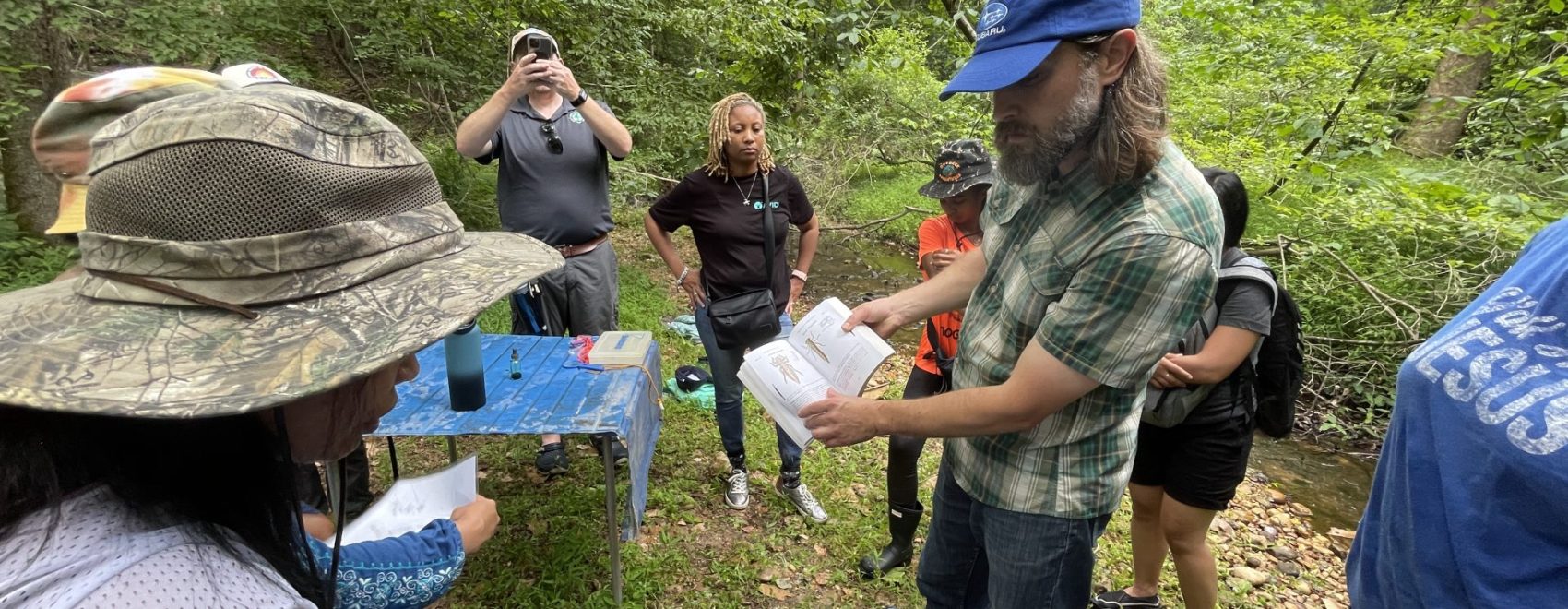Written by Tim Emhoff, Summer Teacher’s Institute Facilitator and Environmental Education Resource Teacher at Nanjemoy Creek Environmental Education Center
It’s a balmy, July morning at Patuxent River Park where Prince George’s County teachers are gathered around picnic tables ready to start the day. Some are enjoying a bagel and coffee while others are applying sunscreen as Alice Ferguson Foundation instructors begin briefing them on the day’s activities, which includes kayaking.
“I’ve never been kayaking…I’m a little scared…not going to lie,” confesses a teacher.
“It’s a lot like canoeing,” chimes in another teacher trying to reassure her.
“Well, I’ve never been canoeing either,” nervously laughs the teacher.
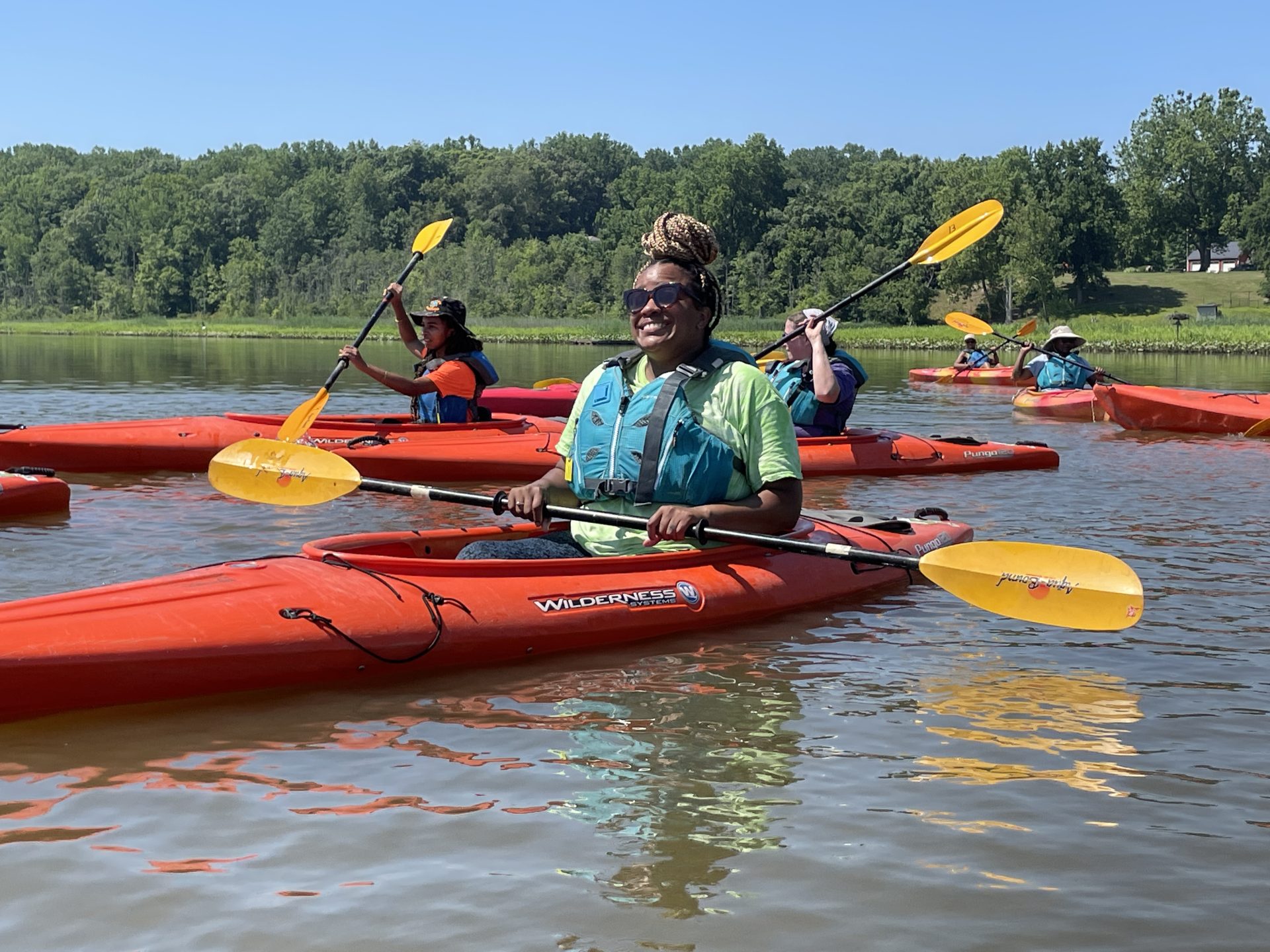
After a quick, shoreline kayaking tutorial and safety talk, the participants begin the laborious process of moving and loading the kayaks onto the launch. The awkward struggle is soon replaced by a graceful glide as each teacher exits the launch into the Patuxent River. For a few minutes, the teachers struggle to apply the paddling tutorial that was taught on shore to actually being in the kayak on the water. Several pick it up quickly, while others need additional coaching to get the hang of it.
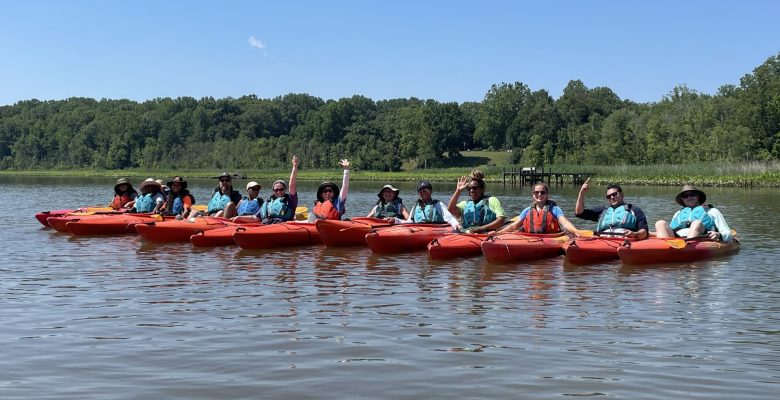
Slowly the string of kayaks moves upstream through the wetlands of the Patuxent, periodically stopping to observe the habitat. Up close, teachers view tall stands of wild rice and cattails, purple flowering pickerel weed and yellow flowering spatterdock and many more unique plants of the marsh. Animals are all around as well. Some are seen by all while others are elusive and seen by a few (primarily the kayaks in the lead). Turtles out sunning quickly slide off their log perches into the water. Mummichogs (small killifish minnows) explode out of the water ahead of the chain of kayaks. A teacher exclaims, “That bird has a fish!” as an osprey flies overhead with the fish oriented head first gripped tightly in its talons. Another yells, “Is that a snake?” Which is followed by some commotion and panicked paddling. The ‘watersnake’ turns out to be a wetland plant that has come loose from the muddy substrate and is freely floating with the changing tide.
The gliding of the kayaks is soon replaced by the awkward struggle as teachers bring the boats back to shore for a well earned lunch break.
After lunch, the participants work in small groups to explore the other habitats of Patuxent River Park from the swamp and the upland forest and the eco-tones or transitions from one habitat to the next. One plant that participants meet right away, right off of the trail is Poison Ivy. “Leaves of three, let it be,” remarks an instructor. Everyone takes note and carefully walks on the opposite side of the boardwalk until they’re clear. The day is getting hotter and the shade of the forest is welcoming as participants complete a scavenger hunt to better understand the ecosystem dynamics that they are observing in real life. They are tasked with finding representations of food chains, adaptations, decomposition, populations, producers, consumers, and many more of the ecosystem niches.
To end the day, the participants board a pontoon boat for a tour of the Jug Bay section of the Patuxent River. The guide shares ecological and historical information about the area. Historically, teachers learn about the indigenous people that once lived along the shores, the role of the river during the War of 1812 and the now abandoned railway that would take people from DC to the Chesapeake Beach Amusement Park. The guide also highlights the ecosystem dynamics taking place all around. Participants learn about the importance of wild rice to the many migrating birds that come through the area. They also gain a better understanding of how invasive plants like purple loosestrife and phragmites can outcompete some of the native wetland plants and disrupt food chains.
The heat of the day is soon forgotten as the guide powers up the motor bringing a cooling breeze as the boat heads back to the dock.
The above is an example of one day of the Environmental Teacher Institute, which has been a summertime staple at Hard Bargain Farm for as long as I can remember. This 10-day environmental/watershed centric training fully immerses participants via integrated curriculum (arts, mathematics, etc.) in local, placed-based settings. Though the institute is designed for 4-8 grade classroom educators, primary and special area educators have also attended. Over the years, hundreds of teachers from primarily Prince George’s County Public Schools have given up part of their summer to attend this one-of-a-kind institute.
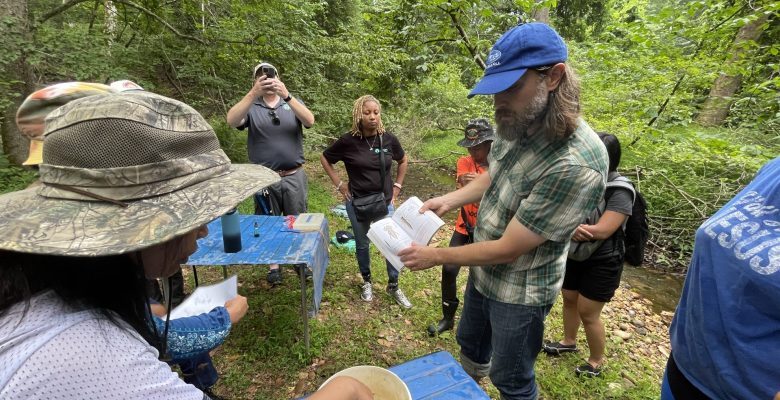
Personally, I have been involved both directly and indirectly with the institute. Indirectly, I was lucky enough to attend as a participant not once, but twice! (Once in 2004 and again in 2010.) Directly, I have been an Institute Facilitator from 2011 to present day. Reflecting, through both lenses (as a participant and as an instructor) on why the training is so successful I have come to the following conclusion…the training is a shared experience that not only equips teachers but also empowers them.
The Experience
The experience maximizes place-based education by fully immersing participants in the assets of each location. The teachers not only interact with Alice Ferguson Foundation’s Hard Bargain Farm, which includes the barnyard and the animals, the state of the art Cafritz Environmental Center, the wet meadow boardwalk and trails, and the living shoreline along the Potomac, but they also interact with various places in their local community. We visit the Materials Recycling Facility in Capitol Heights, the Composting Facility in Upper Marlboro, the Piscataway Wastewater Plant just down the road from Hard Bargain Farm, and, as detailed earlier, Patuxent River Park.
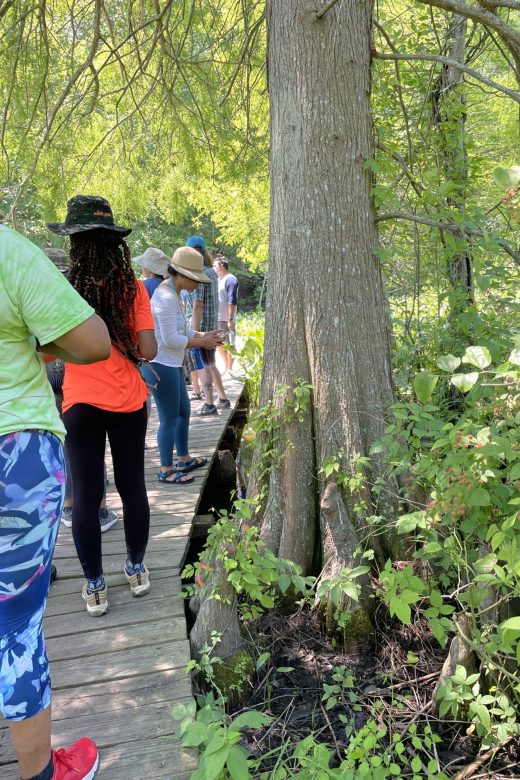
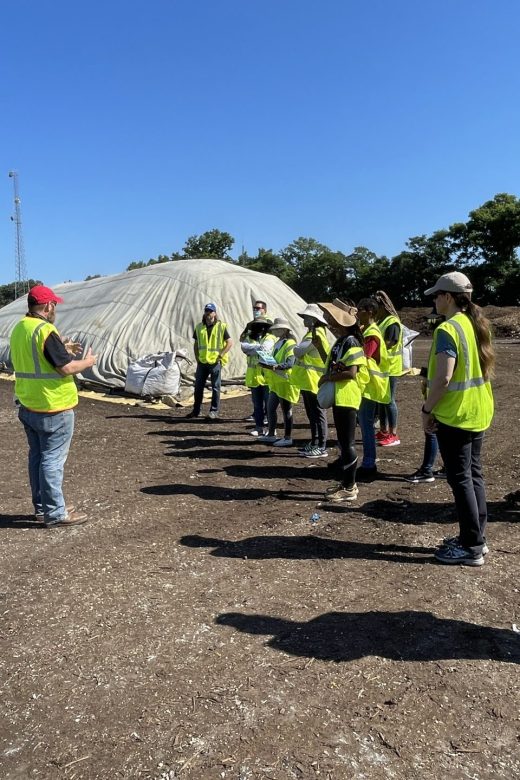
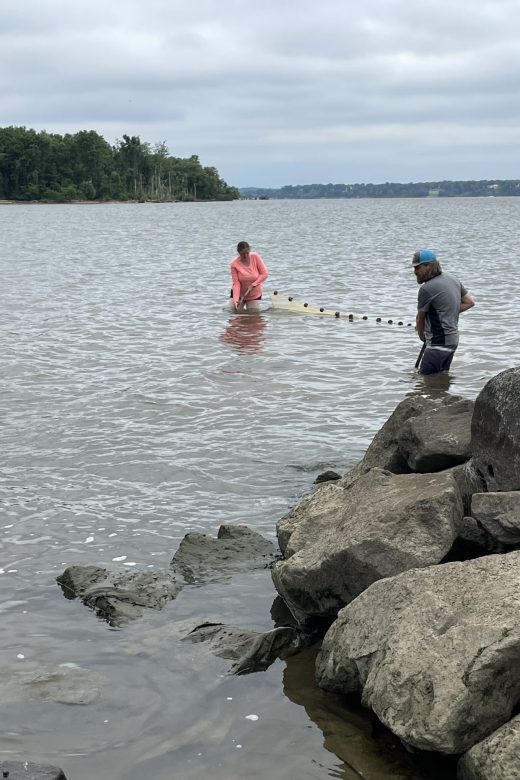
In addition to the place, thematic or themed activities are used daily to further build the experience. For example, when teachers learn about the waste stream (trash, recycling, and composting) they spend one day learning about composting and recycling. The morning is spent at the compost facility and the recycling center to see how the Prince Georges County composts and recycles on an industrial scale. Back at Hard Bargain Farm, teachers get to see the Cafritz Envirnomental Center’s composting toilets (the magic happens in the basement). From there, teachers participate in a lesson on home composting and composting with worm bins. Finally, they get outside and observe how nature composts through natural decomposition of leaves and logs and the organisms that assist in the process.
Equipping and Empowering
Teachers often mark on the pre-institute survey that they lack the confidence in taking their students outside/teaching outdoors and in teaching environmental issues. This is where the amazing Alice Ferguson Foundation staff leads in equipping and empowering the teachers. During the institute, teachers receive a collection of integrated lessons that are easily adaptable. Each instructor walks participants through the respective lesson and models best teaching practices both indoors and outdoors. Time for reflection is built into each lesson. This allows teachers to make the lesson personal to their content, grade, and specific schools. The discussion that follows is equally important as teachers share their unique viewpoints on what’s applicable to their classroom situation.
The teachers are also presented with activities and/or situations that can be ‘challenging” for some. Things like flying insects, fear of snakes, and other outdoor phobias can almost paralyze some into opting out of a lesson. The Foundation staff does a great job of understanding the fears and helping teachers confront them in a non-threatening and healthy way. A recent teacher was extremely scared of snakes and practically left the building when she heard that a snake was in the bin in the front of the room. After the lesson that focused on “nothing is to be feared, only to be understood”, she worked up enough courage to give the baby hognose snake a two fingered pet. But before that transformative moment for her, she gained a better understanding of snakes from the presenter, she witnessed her classmates successfully pet the snake, and she was gently encouraged by staff when it was her turn. In her words, “I’m so proud of myself right now.”
Other activities are challenging in that participants have never done them before and are unsure of what to expect. Things, such as, kayaking, wading into the Potomac, shore seining for fish, dissecting a fish, collecting macroinvertebrates, and more can be tough when you are out of your comfort zone. Again, the Foundation staff works with and encourages teachers throughout the process so that they will be successful. It is all about meeting the participants where they are in terms of comfort level and then working to increase that level.
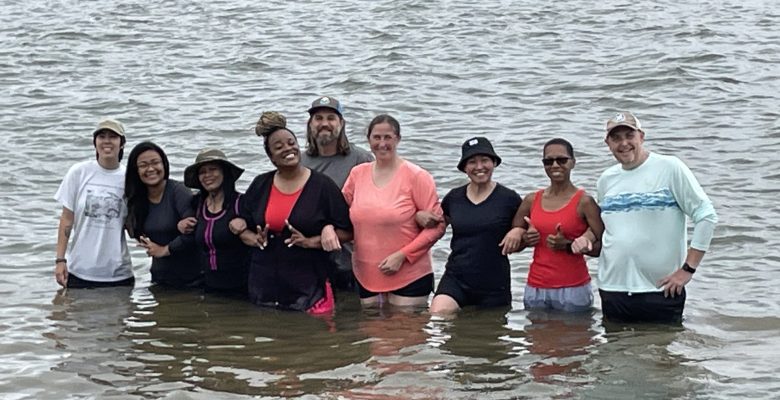
Overall, this summer institute is an one of a kind experience that leads to many transformative moments for the participants. Even though it is a shared experience, everyone leaves with something different…something that really spoke to them personally. (I still remember my moment.) Here’s to many more of those moments as we look forward to next summer and another Environmental Teacher Institute at Hard Bargain Farm.

